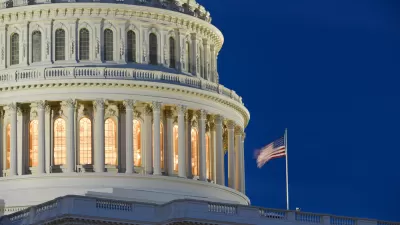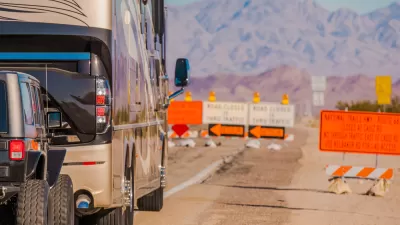Four House Democrats joined all but one Republican to enact the Congressional Review Act to roll back President Biden's rule on heavy truck pollution approved by the EPA last December. The Senate had earlier narrowly passed the joint resolution.

House and Senate Republicans successfully enacted a legislative tool that was heavily used at the beginning of the Trump administration in 2017 to roll back environmental rules approved during the Obama administration. The Congressional Review Act enables both chambers to overturn federally approved rules with a simple majority, thus bypassing the filibuster in the Senate that requires 60 votes. But the resolution is still subject to a presidential veto.
President Joe Biden has signalled that he intends to do just that to save the “Control of Air Pollution from New Motor Vehicles: Heavy-Duty Engine and Vehicle Standards,” approved by the U.S. Environmental Protection Agency on Dec. 20, 2022. It will be his fifth veto since the Republicans took control of the House of Representatives after the red ripple in the midterm elections.
The standards marked “the first update in 20 years to nitrogen oxide rules,” wrote Rachel Frazin who covers energy and environment policy for The Hill, after the rule was approved. NOx are major contributors to ground-level ozone pollution (smog) and particulate matter.
Frazin reported on April 26 on the narrow passage of Senate Joint Resolution 11.
The vote was 50-49. Sen Joe Manchin (D-W.Va.) voted with Republicans to get rid of the rule. Sen. Dianne Feinstein (D-Calif.), who has been absent from the Senate amid health issues, did not vote.
Sen. Deb Fischer (R-Nebraska) made it clear in her statement after the successful vote that her main reason for targeting the air quality rule was inflation and concern that it would not achieve cleaner emissions.
By increasing the cost of a new truck, the regulation actually incentivizes keeping older, higher-emitting trucks in service longer. It would also likely force many “mom & pop” commercial trucking operations out of business while encouraging larger trucking operations to pass these higher costs onto consumers.
House vote
Frazin reports in the source article for this post on the narrow passage (221-203) in the House on May 23. Republicans secured a handful of Democrats from competitive or crossover districts so that the rollback could be viewed as bipartisan.
Democrats Henry Cuellar (Texas), Jared Golden (Maine), Vicente Gonzalez (Texas) and Mary Peltola (Alaska) voted with Republicans in support of overturning the rule. Republican Brian Fitzpatrick (Pa.) voted with the rest of the Democrats against doing so.
Hat tip to The Hill's Energy & Environment newsletter published on May 23.
FULL STORY: House votes in favor of overturning Biden truck pollution rule

Planetizen Federal Action Tracker
A weekly monitor of how Trump’s orders and actions are impacting planners and planning in America.

Congressman Proposes Bill to Rename DC Metro “Trump Train”
The Make Autorail Great Again Act would withhold federal funding to the system until the Washington Metropolitan Area Transit Authority (WMATA), rebrands as the Washington Metropolitan Authority for Greater Access (WMAGA).

DARTSpace Platform Streamlines Dallas TOD Application Process
The Dallas transit agency hopes a shorter permitting timeline will boost transit-oriented development around rail stations.

Car-Centric LA Suburb Looks to a Train-Oriented Future
City leaders in Rancho Cucamonga, the future western terminus of the Brightline West rail line to Las Vegas, want to reimagine the city as a transit-oriented, pedestrian-friendly community.

New Alaska Bitcoin Mine Would Burn as Much Energy as the State’s Largest Coal Plant
Fueled by “stranded” natural gas, the startup hopes to become the largest in the US, and to make Alaska an industry center.

New Jersey Duplexes Elicit Mixed Reactions
Modern, two-unit residences are proliferating in northern New Jersey communities, signaling for some a boon to the housing supply and to others a loss of historic architecture.
Urban Design for Planners 1: Software Tools
This six-course series explores essential urban design concepts using open source software and equips planners with the tools they need to participate fully in the urban design process.
Planning for Universal Design
Learn the tools for implementing Universal Design in planning regulations.
Municipality of Princeton
Roanoke Valley-Alleghany Regional Commission
City of Mt Shasta
City of Camden Redevelopment Agency
City of Astoria
Transportation Research & Education Center (TREC) at Portland State University
US High Speed Rail Association
City of Camden Redevelopment Agency
Municipality of Princeton (NJ)





























